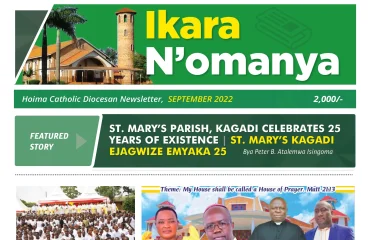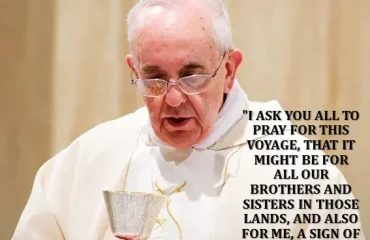MESSAGE OF THE POPE PAUL VI
ON THE FIRST WORLD SOCIAL COMMUNICATIONS DAY
Theme: Church and Social Communication:
First World Communication Day
We address you, dear brothers and sons, as World Communications Day, which will be held for the first time on Sunday, Seventh of May, (Sunday 7th May 1967), approaches.
The Church, realizing “that she is truly and intimately linked with mankind and its history” (1), wishes by means of this initiative, proposed by the Second Vatican Ecumenical Council, to draw the attention of her children and of all men of good will to the vast and complex phenomenon of the modem means of social communication, such as the press, motion pictures, radio and television, which form one of the most characteristic notes of modern civilization.
Thanks to these wonderful techniques, man’s social life has taken on new dimensions: time and space have been conquered, and man has become as it were a citizen of the world, sharing in and witnessing the most remote events and the vicissitudes of the whole human race. As the Council has said, “we can already speak of a true social and cultural transformation, one which has repercussions on man’s religious life as well” (2). To this transformation the means of social communication have greatly contributed, at times in a decisive manner, we are even now nearing new, amazing developments, such as that of world-wide television through artificial satellites. In all this We see the unfolding and the realization of a wonderful plan of God’s providence, which opens to man’s genius ever new ways of achieving his perfection and of attaining to his final end.
One must therefore, give full credit, at its true worth, to the contribution made by the press, motions pictures, radio and television as well as the other instruments of social communication, to the enrichment of culture, to the spread of various artistic forms, to recreation, to mutual knowledge and understanding among peoples and also towards the spread of the Gospel message.
However, while the magnitude of this phenomenon, which now embraces both individuals and the whole community of man, is reason for admiration and satisfaction, it also gives cause for reflection and concern. These instruments, as it happens, destined as they are by their very nature to spread thought, human expression, the image, information and publicity, not only act on public opinion and, consequently, on the modes of thought and action of individuals and social groups, but also bring pressure to bear upon minds, leaving their deep mark upon the mentality and the conscience of man who is being pressed and almost overpowered by a multiplicity of contradictory appeals.
One cannot ignore the danger and the damage which these means, however noble in themselves, can inflict upon individuals and society when they are not employed by man with a sense of responsibility, with an honest intent and in conformity with the objective moral order.
The greater, in fact, the power and the ambivalent efficacy of these means, the greater must be the care and the responsibility with which they are to be employed.
It is therefore with sentiments of esteem and friendship and the certainty that We are interpreting the expectations and anxieties of honest men everywhere, that We address all who are devoting their ability and their work to this sensitive and important sector of modern life. We entertain the hope that the noble service, which they are called upon to render to their brothers, may always measure up to the nobility of the mission which makes them intermediaries and, as it were masters and guides, between the truth and the public, the reality of the exterior world and the inner reaches of conscience.
Just as they have the right not to be conditioned by undue ideological, political and economic pressures, which limit their just and responsible freedom of expression, so their speaking to the public demands a respect for the dignity of man and of society. Let every effort of theirs be directed towards spreading truth in men’s minds, loyalty to what is good in their hearts and consistency in their actions. Thus they will contribute towards the uplift of humanity and will play a constructive part in the building of a new society that will be freer, more alert, more responsible, more brotherly and more noble (3).
We have particularly in mind the younger generations. Not without difficulties and at times apparent or real lapses, these are seeking to give direction to their present and future lives. They must be able to make their choices in freedom of spirit and with a sense of responsibility. Hindering or leading astray with false perspectives their strenuous efforts would mean deceiving their just expectations, confusing their noble aspirations and killing their generous impulses.
With a fatherly heart We renew our pressing plea to the worthy members of the professional world of social communications, particularly to those among them who glory in the name of Christians, asking them to bear “witness in the cause of the “World”, that in all its temporal expressions must be a faithful echo of the eternal, uncreated Word, the Word of the Father, the Light of intellects, the Truth that so ennobles us” (4).
It is necessary, however, that the efforts of the workers in the field of social communications be seconded by the united cooperation of all, for it is the responsibility of all that is put to the test: that of parents who are the first, irreplaceable educators of their children; that of teachers whose task it is to instruct their pupils in the knowledge and understanding of the language of modern techniques, showing them how to appreciate what is put forward, how to use these means sensibly with moderation and self-discipline. The responsibility of young people is brought into play, for they are called upon in a high degree to exploit these instruments in their own personal education as well as in the promotion of brotherhood and peace among men. The public authorities too exercise their responsibility in the furtherance and the defence of the common good with due respect for true liberty. Finally, this is the concern of all readers spectators and hearers as they are called upon to choose carefully and wisely their daily newspapers and their periodicals, their motion pictures and their broadcasts; they are to help render communication nobler and higher, more worthy, that is, of responsible and mature human beings.
Most helpful and laudable is therefore, every serious initiative that aims at forming the critical judgment of the reader and spectator, and at inducing him to evaluate the news, the ideas and the images that are presented to him, not only under the aesthetical and technical aspects, but also from the human, moral and religious point of view, bearing in mind the highest values of life.
The Church too, wishes to make her own contribution to the orderly development of the world of social communications: a contribution of inspiration, encouragement, exhortation, guidance and cooperation.
Precisely for this reason the Second Vatican Ecumenical Council has made this a subject of study: the Conciliar Decree on the Instruments of Social Communication, and the corresponding Pastoral Instruction which is now being prepared, bear witness to the Church’s motherly interest in the furtherance of human values which Christianity, as it embraces them wholeheartedly, renders more vital and nobler, Christianity directs them towards the supreme end of man, bringing it about that real, fruitful moral and spiritual progress go hand in hand with remarkable technical advance.
We therefore express the hope that this “Day” may prove an occasion for a considered appeal aimed at an awakening of consciences and a united endeavour on the part of all in such an important cause. We exhort Our sons and daughters to undertake generous action, in prayerful unity of intent with their Pastors and with all who are willing to give their welcome cooperation, in order that, with God’s help and the intercession of the Blessed Virgin, they might attain those results that the celebration of World Communications Day aims at achieving for the good of mankind.
These are the dearest hopes that We wish to manifest on the eve of the first World Communications Day, while We pray from Our heart for abundant divine blessings on all who are listening to Us, and on all who employ in this field their technical skill, their intellectual inspirations and their spiritual yearnings.
From the Vatican, 7 May 1967
PAULUS PP. VI
NOTE
(1) Constitutio Pastoralis de Ecclesia in mindo huius temporis prooemium.
(2) ibid, Expositio introductiva.
(3) cfr. Pius XII, Discourse to the European Union Radiodiffusion; Discorsi e Radiomessaggi, vol. 17, p. 327.
(4) cfr. Discourse to the National Council of the Italian Federation of the press; Oss. Rom. June 24, 1966.




You must be logged in to post a comment.